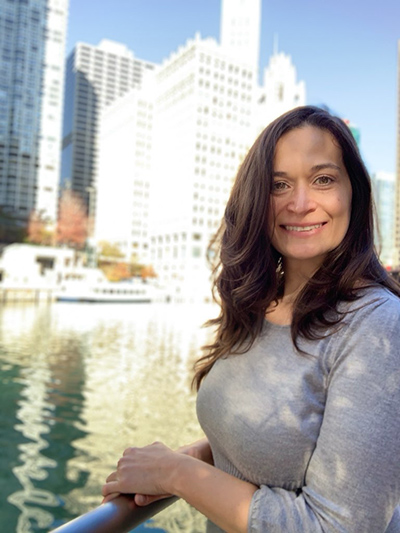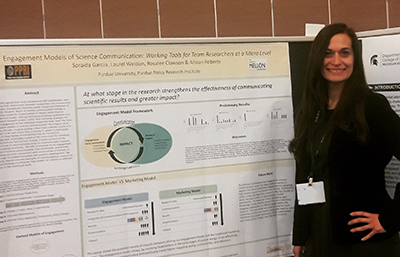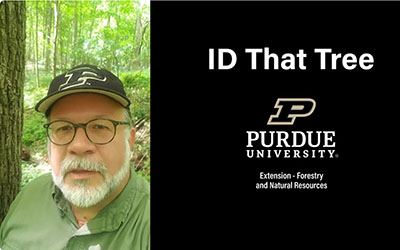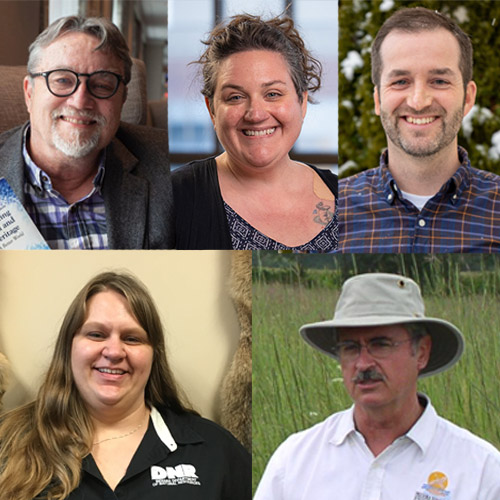Garcia Shares Experiences as Underrepresented Minority in Magazine Article
 Soraida Garcia received her master’s degree in ecological sciences and engineering (ESE) from Purdue in August 2021 after presenting her defense on “Understanding the disturbance of human recreation on wildlife using multiple dynamic agents within an IBM framework,” under the advisement of Pat Zollner, professor of wildlife science.
Soraida Garcia received her master’s degree in ecological sciences and engineering (ESE) from Purdue in August 2021 after presenting her defense on “Understanding the disturbance of human recreation on wildlife using multiple dynamic agents within an IBM framework,” under the advisement of Pat Zollner, professor of wildlife science.
In the article “Making the Change” published in the March/April 2022 issue of The Wildlife Professional, Garcia shares her experiences as an underrepresented minority in the natural world and in the collegiate environment. The Chicagoan of Puerto Rican heritage talks about making her way toward a career in wildlife biology as a first-generation college student with little previous exposure to nature. She also shares about the challenges of balancing a job and classwork/research and maneuvering through classes with a cognitive disability.
“I felt that I had to share my experience to other underrepresented students so they are aware of what to expect when attending graduate school,” Garcia said. “Many of us come from backgrounds that do not prepare us for these institutions. I hope to reach all the people involved with the graduate school process, including the graduate student. I feel that when a student with my background enters this process they have to be guided from the very first day. The guidance I received was not tailored to my needs as an underrepresented student and it made it difficult for me to adjust to the program, causing me to stumble through graduate school. I fear that this happens to many students, and it is not recognized and just seen as a failure of the student.”
Garcia has many ideas of how institutions can assist individuals like herself during their time as a graduate student.
“I want someone in an institution to start a standard curriculum for incoming underrepresented graduate students.,” Garcia said of her hopes. “This curriculum should have meetings with a diversity officer at least twice a month (someone that is also underrepresented), less TA tasks for the student (because they may require more time for classes and research due to their background), and an advisor that is seasoned (because a new advisor does not have experience with all cultures, and we do not all learn the same way). There is much more that we can do, but this would be a great start.”
 After changing departments and advisors, Soraida eventually found a home in Zollner’s lab, Garcia successfully completed her master’s degree and is now a PhD student at the University of Illinois-Chicago. She hopes that after reading the article in The Wildlife Professional fellow graduate students realize that when it comes to their education, they have a voice and can and should advocate for themselves, which can make their educational journey smoother.
After changing departments and advisors, Soraida eventually found a home in Zollner’s lab, Garcia successfully completed her master’s degree and is now a PhD student at the University of Illinois-Chicago. She hopes that after reading the article in The Wildlife Professional fellow graduate students realize that when it comes to their education, they have a voice and can and should advocate for themselves, which can make their educational journey smoother.
“My advice to a current graduate student that is having a difficult time with their curriculum is to create a team of people that care about you,” Garcia stated. “They don’t have to be in your department. As a matter of fact, I encourage you to go outside of your department and find good people that want to help. Share your story before it’s too late. Don’t be afraid of what people will say if you speak up. This is your life and no one can change the current situation but you. Also, don’t think there is something wrong with you. Academia is a place to receive new knowledge. You should not be expected to know it all when you get in, so don’t let anyone make you feel bad or put you on the spot if you don’t know something. That is why you are there, to learn. Ask lots of questions and don’t be ashamed to. It’s their job to answer all the questions you have. Lastly, don’t waste time with an advisor you are not compatible with. Be strong and don’t give up!”
Click here to read the full text of Garcia's article "Making the Change" from The Wildlife Professional.






